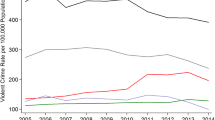Abstract
Psychologists in academic health centers (AHC) face important ethical issues including confidentiality when working with a multidisciplinary team, sharing of information through the electronic health record, obtaining informed consent in a fast-paced healthcare environment, cultural competency in the medical setting, and issues related to supervision and training. The goal of this paper is to describe ethical issues for psychologists in AHCs in the context of case examples, and to consider ethical decision-making tools to enhance clinical care. Considerations for best practices in integrated care settings will be discussed, and the APA Ethical Standards will be referenced throughout.
Similar content being viewed by others
Notes
The case examples described in this paper are fictionalized composite cases similar to actual cases seen in clinical practice in AHCs.
References
American Psychological Association. (1990). Guidelines for providers of psychological services to ethnic, linguistic, and culturally diverse populations. http://www.apa.org/pi/oema/resources/policy/provider-guidelines.aspx.
American Psychological Association. (2010). Ethical principles of psychologists and code of conduct. http://www.apa.org/ethics/code/index.aspx.
Association of State and Provincial Psychology Boards. (2005). ASPPB code of conduct. Montgomery, AL: Association of State and Provincial Psychology Boards. http://www.asppb.org/publications/model/conduct.aspx.
Association of State and Provincial Psychology Boards. (2015). Supervisory guidelines for education and training leading to licensure as a health service provider. Montgomery, AL: Association of State and Provincial Psychology Boards. http://c.ymcdn.com/sites/www.asppb.net/resource/resmgr/Guidelines/Final_Supervision_Guidelines.pdf.
Bernard, J. M., & Goodyear, R. K. (2014). Fundamentals of clinical supervision (5th ed.). Uppers Saddle River, NJ: Pearson.
Bibla, T., Pena, A., & Bruce, C. (2015). Consultations across languages. Hastings Center Report 45, 13–14.
Clemens, N. A. (2012). Privacy, consent, and the electronic health record: The person vs. the system. Journal of Psychiatry Practice, 18, 46–50.
Falender, C. A., & Shafranske, E. P. (2004). Clinical supervision: A competency-based approach. Washington, D.C.: American Psychological Association.
Fisher, C. B. (2014). Multicultural ethics in professional psychology practice, consulting, and training. In F. T. L. Leong, L. Comas-Diaz, G. C. Nagayama Hall, V. C. McLoyd, J. E. Trimble (Eds.), APA handbook of multicultural psychology, Vol. 2: Applications and training (pp. 35–57). Washington, D.C.: American Psychological Association.
Greenfield, D., & Pawsey, M. (2014). Medical tourism raises questions that highlight the need for care and caution. Medical Journal of Australia, 201, 568–569.
Hodgson, J., Mendenhall, T., & Lamson, A. (2013). Patient and provider relationships: Consent, confidentiality, and managing mistakes in integrated primary care settings. Families, Systems and Health, 31, 28–40.
Hudgins, C., Rose, S., Fifield, P. Y., & Arnault, S. (2013). Navigating the legal and ethical foundations of informed consent and confidentiality in integrated primary care. Families, Systems, & Health, 31, 9–19.
Knapp, S. J., & VandeCreek, L. D. (2012). Practical ethics for psychologists: A positive approach (2nd ed.). Washington, D.C.: American Psychological Association.
Lunt, N., & Mannion, R. (2014). Patient mobility in the global marketplace: A multidisciplinary perspective. International Journal of Health Policy Management, 2, 155–157.
Nielsen, B. A., Baum, R. A., & Soares, N. S. (2013). Navigating ethical issues with electronic health records in developmental-behavioral pediatric practice. Journal of Developmental & Behavioral Pediatrics, 34, 45–51.
Ohio Board of Psychology. (2014). Laws and rules governing the practice of psychology. Columbus, OH: Requirements pertaining to supervision. Retrieved July 17, 2017 from http://codes.ohio.gov/oac/4732-13-04.
Snyder, J., Johnston, R., Crooks, V. A., Morgan, J., & Adams, K. (2016). How medical tourism enables preferential access to care: Four patterns from the Canadian context. Health Care Analysis. https://doi.org/10.1007/s10728-015-0312-0.
U.S. Department of Health & Human Services, Office of Minority Health. (2013). National standards for culturally and linguistically appropriate services in health and health care: A blueprint for advancing and sustaining CLAS policy and practice. https://www.thinkculturalhealth.hhs.gov/Content/clas.asp.
Van Liew, J. R. (2012). Balancing confidentiality and collaboration within multidisciplinary health care teams. Journal of Clinical Psychology in Medical Settings, 19, 411–417.
Author information
Authors and Affiliations
Corresponding author
Ethics declarations
Conflict of interest
The authors Kathleen Ashton and Amy Sullivan declare that they have no conflict of interest.
Human and Animal Rights
All procedures were in accordance with the ethical standards of the institutional research committees and with the 1964 Helsinki declaration and its later amendments or comparable ethical standards.
Informed Consent
Informed consent was obtained from all individual participants included in the study.
Rights and permissions
About this article
Cite this article
Ashton, K., Sullivan, A. Ethics and Confidentiality for Psychologists in Academic Health Centers. J Clin Psychol Med Settings 25, 240–249 (2018). https://doi.org/10.1007/s10880-017-9537-4
Published:
Issue Date:
DOI: https://doi.org/10.1007/s10880-017-9537-4




